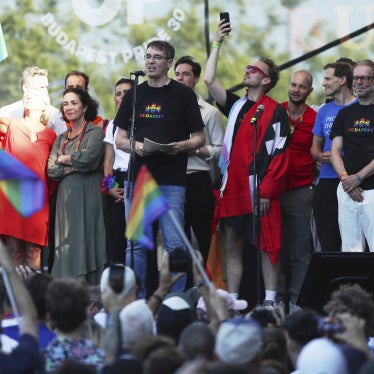The European Court of Human Rights’ ruling that a lesbian woman can embark on the process of adopting a child means European states should ensure equality in the right to found a family, Human Rights Watch said today.
The court, ruling on January 22, 2008 in the case of E.B. v. France, held by 10 votes to seven that the French authorities’ refusal of a lesbian’s application to obtain authorization to adopt a child on the grounds of her sexual orientation was unlawful. The court said France had violated Article 14 (prohibition of discrimination) and Article 8 (right to respect for private and family life) of the European Convention on Human Rights.
“This groundbreaking ruling means governments can’t use sexual orientation to stop someone from adopting a child,” said Scott Long, director of the Lesbian, Gay, Bisexual, and Transgender Program at Human Rights Watch. “Adoption decisions should be based on the best interests of the child, uncontaminated by prejudice.”
The court is the oversight mechanism for the European Convention and its decisions are binding across the 47 members of the Council of Europe (CoE) who have ratified the convention.
The decision marks a turning point in the court’s jurisprudence on family rights. In a previous 2002 case, Fretté v. France, the European Court of Human Rights had ruled, four votes to three, that preventing a gay man from applying to adopt a child because of his sexual orientation did not violate the convention.
The plaintiff in the present case, E.B., is a 45-year-old nursery school teacher who has lived with a woman psychologist, R., since 1990. In February 1998, E.B. applied to the Jura Social Services Department to adopt a child, informing them about her sexual orientation and her relationship with R. The adoption board recommended rejecting the application in November 1998. In March 1999, the president of the council of the Jura Social Services Department refused the petition, affirming the board’s decision. On June 5, 2002, the national Conseil d’Etat confirmed this decision. French law specifically permits single people to apply to adopt children. However, the rejections cited the absence of a “paternal referent” in the applicant’s home.
In its decision, the court found that, having expressly extended the “right to apply for authorization to adopt” to single parents, France “could not then take discriminatory measures in applying it.” It found that the terms of the rejections constituted implicit discrimination based on sexual orientation. The court has thus established a precedent that adoption procedures must offer fair treatment not only to single parents, but to lesbian and gay potential parents.
While many European states – from Spain to Hungary – have opened either full civil marriage or some form of civil-union status to same-sex partners, some restrict lesbians and gays from adopting children either individually or as couples. States including Iceland, the Netherlands, Spain, Sweden, and the United Kingdom allow same-sex couples to adopt children jointly. Denmark, Germany, and Norway permit one lesbian or gay partner to adopt the other’s children. Among others, Portugal and Italy keep gays and lesbians from adopting.
The current decision ensures that governments that allow for single parent adoption will no longer be able to exclude people from applying for adoption based solely on their sexual orientation.
“Sexual orientation should not be a factor in determining the best interest of the child,” said Long. “Prejudice should never interfere with giving children the care and love they deserve.”







